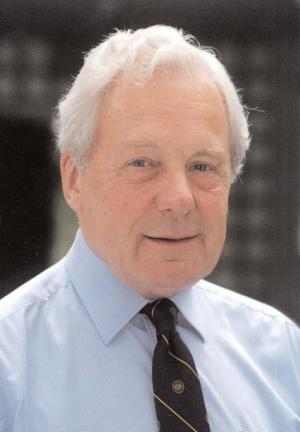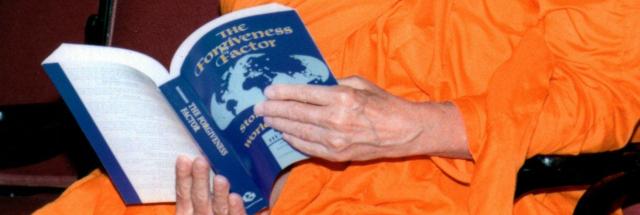An optimistic realist
 The upgrading of my website has been an education for me.
The upgrading of my website has been an education for me.
It was suggested to our webmaster that she start with me as I would be the easiest website to deal with. She discovered that was not the case as I am not so conversant as some with the intricacies of website design and language. However, she has produced what I hope will be a good complement to the other related sites.
The website is a reminder of how far we have come, or should I say, at 81 how far I have come, from when I had my first article published in 1952 in an Indian newspaper, and then, in the mid 50s, sent out articles by post regularly from Lagos to West African newspapers, and in the late 50s was really modern when I obtained, with a legacy from my godmother, a Baby Hermes portable type writer. This was incidentally purchased from the Frankfurt shop run by the aunt of our technical expert, Heinrich Pick. That was in the days when press communication around the world was by the Commonwealth rate of a penny a word cables or by telexes and faxes. In the 60s I found myself reporting about IofC initiatives from places like Vietnam and Taiwan and Japan.
In the 80s in Portland, Oregon, Swiss visitors Marcel and Theri Grandy, took pity on me as I laboured away on my weekly public radio talks on the Hermes and gave me, wait for it, an electric typewriter. What a marvel! After that over the years has come a succession of computers, which despite their ability to crash or with a wrong click to destroy a week’s work, have made life both easier and harder. Harder because it is so easy to do much more in the time available, to change a lead, to keep a piece in accessible form for another use, etc. I haven’t yet graduated to ipads and ipods and apps of all kinds although I am glad that two of my books are now available as ebooks.
The one constant in all these years is not new technology but old human nature and the challenge through each new developing means of communication to reach readers in ever increasing numbers with life-giving truth. Stories of real change, as our director of communications puts it, inspire real change. I hope that the new look and content will draw many more visits to all our sites.
As well as adding new stories – like the inspiring experience I got to know about recently of the Derry man who was blinded as a boy by a British soldier and has forgiven him – I plan to recycle stories, largely forgotten from times past, which still have relevance and useful application today. I make available from recent books, for instance, the background stories of people now in the news, like ‘The imam and the pastor’ from Nigeria, Assaad Chaftari and Mohieddine Chehab from Lebanon, and Ginn Fourie and Letlapa Mphalele from South Africa about whom a film will shortly be released. There is also the chance for those who have not read Ice in Every Carriage to learn about the adventurous move we made in 1952-53 in South Asia with Frank Buchman and 100 people with four stage productions.
My brother Gerald, 13, and I, 15, first attended a conference in Caux, Switzerland in 1947. One can in a way trace my website and my writing about the healing of history back to a dramatic experience in our mother’s life that summer. Our Protestant family had been chucked out of Ireland in 1922 when she was a teenager and in Caux she came face to face with a leading Irish Catholic Senator, Eleanor Butler. My mother’s apology to her for her bitterness was the start of a life commitment of our family. The senator went home and became one of the founders of the Glencree centre of reconciliation.
I never initially thought about writing about forgiveness or about conflict resolution. The amazing experiences I witnessed over the years at Caux and around the world were not a focus on these now fashionable subjects but simply observing the effect of the recognition by thousands of men and women that if you wanted to bring an answer in the world you had to start with your own life and your own country. It was clear even in earlier days the personal change could have national and international ramifications.
There are two other important aspects that are featured on this website. One is the evacuation of children to the United States in World War II and the other is the unusual, and sometimes history-affecting activities, of members of my family.
My brother, Gerald, and I spent five wartime years with an American family with whom we are still in touch. In the summer of 1940 a Gallup Poll indicated that five million American families were willing to take in British children at a time when the country was under the threat of Nazi invasion. It was a tremendous demonstration of American generosity. In September the sinking by a torpedo of the City of Benares, with more than 80 children killed, brought home to British families the dangers and the overseas evacuation came to a halt. In the event only three to four thousand of us had made it safely through and the thirty thousand who had been signed up to go the US were disappointed or relieved. Few people know much about this aspect of World War II and it is covered in these pages.
I also have included some interesting sidelights on my family from the more recent entry of my wife, Erica, into the Guinness World Records and her appearance on the Antiques Roadshow to the story of my Irish great, great, great grandfather who was regarded as one of the founders of modern policing and his brother who is regarded by some as Canada’s greatest traitor. And I have a few more surprises I am going to add.
So particular thanks to Barbara Down and Heinrich Pick for their work on the site and welcome to all of you to browse.
Michael Henderson

